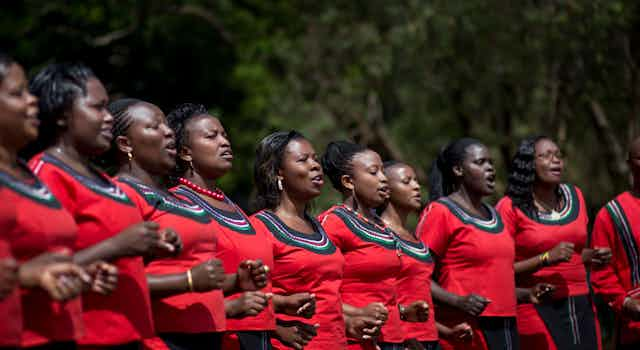Kenya is marking 60 years since its independence from British colonial rule on December 12, 1963. Each year, the country celebrates the occasion with a national holiday, Jamhuri Day. And for much of the past 60 years, patriotic choral music has been a regular feature of those celebrations.
In this episode of The Conversation Weekly podcast, we explore how much one song can tell you about the politics of a new nation – and who controls what gets remembered and what gets forgotten.
Doseline Kiguru grew up hearing the song Wimbo wa Historia on Kenyan national radio in the 1980s and 1990s. Kiguru says the piece of choral music, which means “song of history” in Kiswahili, was often played on national holidays.
Today, Kiguru is a research associate in cultural and literary production in Africa at the University of Bristol in the UK. She has published research with her colleague Ernest Patrick Monte on the history of patriotic choral music and the role it plays in Kenyan political culture.
Wimbo wa Historia was written in the 1960s by the composer Enock Ondego. “It’s trying to write history through music,” explains Kiguru. The song focuses on Jomo Kenyatta, the first president of Kenya. According to Ondego’s autobiography, it was first performed by schoolchildren in front of Kenyatta himself.
The lyrics recount a part of Kenya’s violent history in the lead up to independence, including Kenyatta’s imprisonment, release and visit to London for negotiations on the country’s new constitution.
We argue that presenting the first president as somebody that suffered not only emotionally, but physically in so many different ways, it means that when he becomes president … you’re supposed to revere him, he’s the person who sacrificed the most. So that means his position as a leader of government, his position as president should not be questioned. It means that we are foregrounding specific individuals, and this later became known as a cult of personalities in Kenya.
The music became a stalwart at national holiday celebrations in the late 20th century. It fell out of favour in the early 2000s, but then had a comeback after 2013 when Uhuru Kenyatta, the son of Jomo Kenyatta, became president.
When Uhuru Kenyatta’s term ended in 2022, he was replaced by the current president, William Ruto. Kiguru says the song hasn’t been played at national holiday celebrations since Ruto’s election, but she speculates that it could still reappear because of the way it frames Kenya’s leaders in a cult of personality.
Listen to the full interview with Doseline Kiguru on the The Conversation Weekly, and read an article she wrote about her research into Kenyan choral music here too.
A transcript of this episode is now available.
This episode was produced by Katie Flood and Mend Mariwany. It was written by Gemma Ware, who is the executive producer of the show. Our theme music is by Neeta Sarl.
Newsclips in this episode from British Pathé, DW News and Al Jazeera English. Wimbo wa Historia original version from ArapKaruiTV and Leyla’s 2018 version from DJ Survival Kenya. Additional music from Heko Jamhuri by Muungano National Choir from Tamasha Records.
You can find us on X, formerly known as Twitter @TC_Audio, on Instagram at theconversationdotcom or via email. You can also subscribe to The Conversation’s free daily email here.
Listen to The Conversation Weekly via any of the apps listed above, download it directly via our RSS feed or find out how else to listen here.

